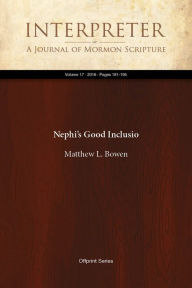Nephis Good Inclusio Matthew L. Bowen Author
by Matthew L. Bowen
2021-04-07 02:34:30
Nephis Good Inclusio Matthew L. Bowen Author
by Matthew L. Bowen
2021-04-07 02:34:30
As John Gee noted two decades ago, Nephi is best explained as a form of the Egyptian word nfr, which by Lehi's time was pronounced neh-fee, nay-fee, or nou-fee. Since this word means good, goodly, fine, or fair, I subsequently posited several possibl...
Read more
As John Gee noted two decades ago, Nephi is best explained as a form of the Egyptian word nfr, which by Lehi's time was pronounced neh-fee, nay-fee, or nou-fee. Since this word means good, goodly, fine, or fair, I subsequently posited several possible examples of wordplay on the name Nephi in the Book of Mormon, including Nephi's own autobiographical introduction (1 Nephi 1:1: I, Nephi, having been born of goodly parents ... having had a great knowledge of the goodness and the mysteries of God). It should be further pointed out, however, that Nephi also concludes his personal writings on the small plates using the terms good and goodness of God. This terminological bracketing constitutes a literary device, used anciently, called inclusio or an envelope figure. Nephi's literary emphasis on good and goodness not only befits his personal name, but fulfills the Lord's commandment, thou shalt engraven many things ... which are good in my sight (2 Nephi 5:30), a command which also plays on the name Nephi. Nephi's autobiographical introduction and conclusion proved enormously influential on subsequent writers who modeled autobiographical and narrative biographical introductions on 1 Nephi 1:1-2 and based sermons -- especially concluding sermons -- on Nephi's good conclusion in 2 Nephi 33. An emphasis in all these sermons is that all good/goodness ultimately has its source in God and Christ.
Less






























